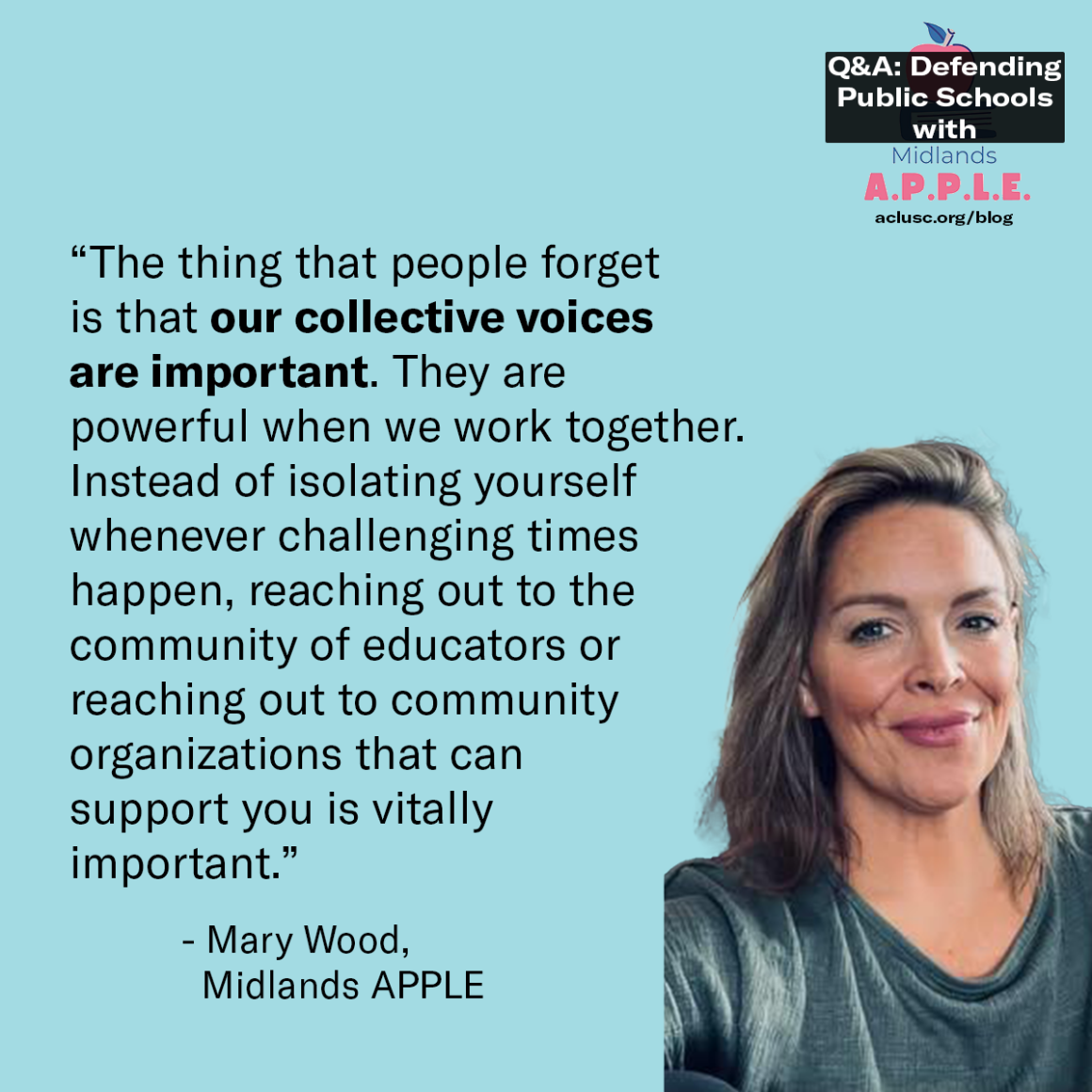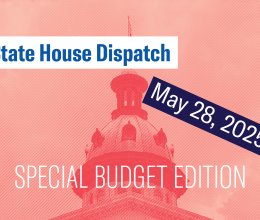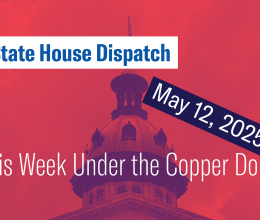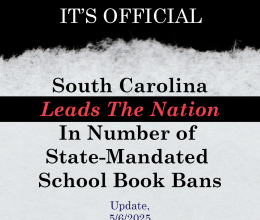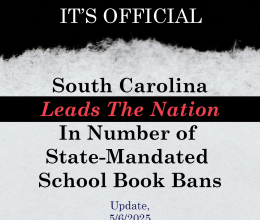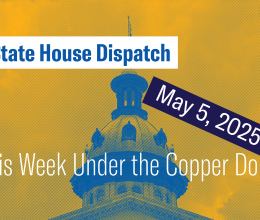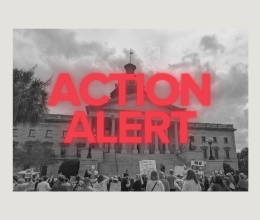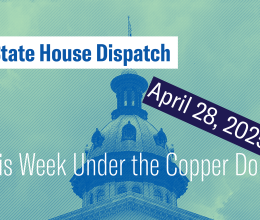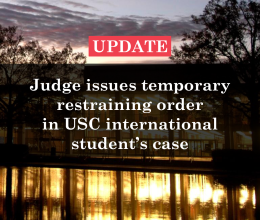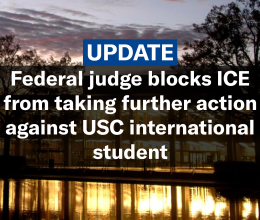
The last time we highlighted Mary Wood in 2023, she was in the national news spotlight for assigning Ta-Nehisi Coates’ nonfiction book Between the World and Me in her class at Chapin High School and facing censorship from her school district. She’s stayed busy since then.
In addition to continuing her work as a teacher, Mary has joined with other teachers and community members in the greater Columbia area to launch a new advocacy group called Midlands APPLE (Advocates Protecting Public Libraries and Education). Their mission statement: “Educating and empowering the Midlands around issues that threaten public education, especially any form of censorship.”
If you are in the area and interested in joining Midlands APPLE, check out the group’s Facebook page, private Facebook group, and Instagram account @MidlandsApple. You can also sign up for the Midlands APPLE newsletter by sending an email to [email protected].
The following interview has been edited for length.
Tell me about Midlands APPLE. Who is a part of it, and what are you hoping to accomplish?
I guess it was back in November, [ACLU-SC Advocacy Director] Josh Malkin introduced me to a few other women who are interested in joining the fight against censorship and essentially the dismantling of public schools in South Carolina. While there were groups in the Lowcountry and the Upstate, there was nothing in the Midlands.
We are trying to activate people locally, to get them to speak out about everything from censorship to teachers’ rights to vouchers — all of those things that are affecting public education right now.
The group is for everybody. Any concerned citizen, people with children, people without children, people who understand that democracy thrives from an educated electorate, teachers obviously, librarians obviously, politicians — anybody who is invested in public education is welcome to join.
How can people join if they want to get involved?
They can find us on Facebook. We have a Facebook group called Midlands APPLE. You have to answer a few questions to join, just to make sure you are an ally to our cause. We provide information on the Facebook page as far as legislation that is coming, State Board hearings about book bans, information about vouchers, information about learning labs which we do. We also have a newsletter that we send out once a week that talks about things that are happening for that week, things that are coming up, and ways to get involved.
In the past few years there have been some inspiring examples of students, parents, librarians, and teachers pushing back against censorship and attacks on public education around the state. I’m thinking of groups like Families Against Book Bans, the DAYLO chapters in Beaufort and Charleston County, CAPE in York County. What lessons are you taking from them as you launch APPLE?
The importance of being proactive, of staying committed to the cause of supporting public education.
Last week there was a screening of Banned Together, which follows those students and their allies from Beaufort County, and what an inspiring example of how to organize and how to be persistent, how to stand up for what is right. That’s a wonderful example for all of us, and it shows that student voices are impactful, that allyship is vital, and that persisting is absolutely necessary to effecting change.
Of course all of these groups that you mentioned like CAPE and FABB are wonderfully organized, and they’ve got some strong people helming their organizations. They’ve put in a lot of work that is outside the bounds of regular life and regular jobs, and so it takes extra energy, but it’s done and applied in a beautiful way.
Looking ahead at 2025, what are some bills, or even just some trends you’re noticing in school boards and the State House, that APPLE will be pushing back against?
The voucher issue is a major one. It’s essentially one way to defund public schools, which cannot be acceptable, no matter where you fall on the political spectrum. You should want all children to be educated fairly and appropriately, and those voucher bills are dangerous and segregating schools not just along racial lines but along socioeconomic lines.
We also have the banning of books in South Carolina. It’s appalling that a single parent can demand that 800,000 students in the state of South Carolina be prevented from accessing literature in libraries. That is terrifying. If we talk about parental rights, there are 799,999 other children in South Carolina whose parents should have rights over what their children are able to access in schools.
The censorship of literature in the classrooms from the budget provisos — all of these things are really important, and they are dangerous to preparing children for real life, to helping them to develop perspectives, to safeguarding democracy, to getting these children ready for college.
You became a national figure in 2023 after your school district ordered you to stop teaching Between the World and Me by Ta-Nehisi Coates in your Advanced Placement class. Are you continuing to assign the book this school year? What has happened this time?
We haven’t gotten to it in my AP Language class yet, but it is coming up. Last year I jumped through the hoops and did all the things and was able to teach Between the World and Me again, and I intend to do the same things, given the final approval I receive from the district office.
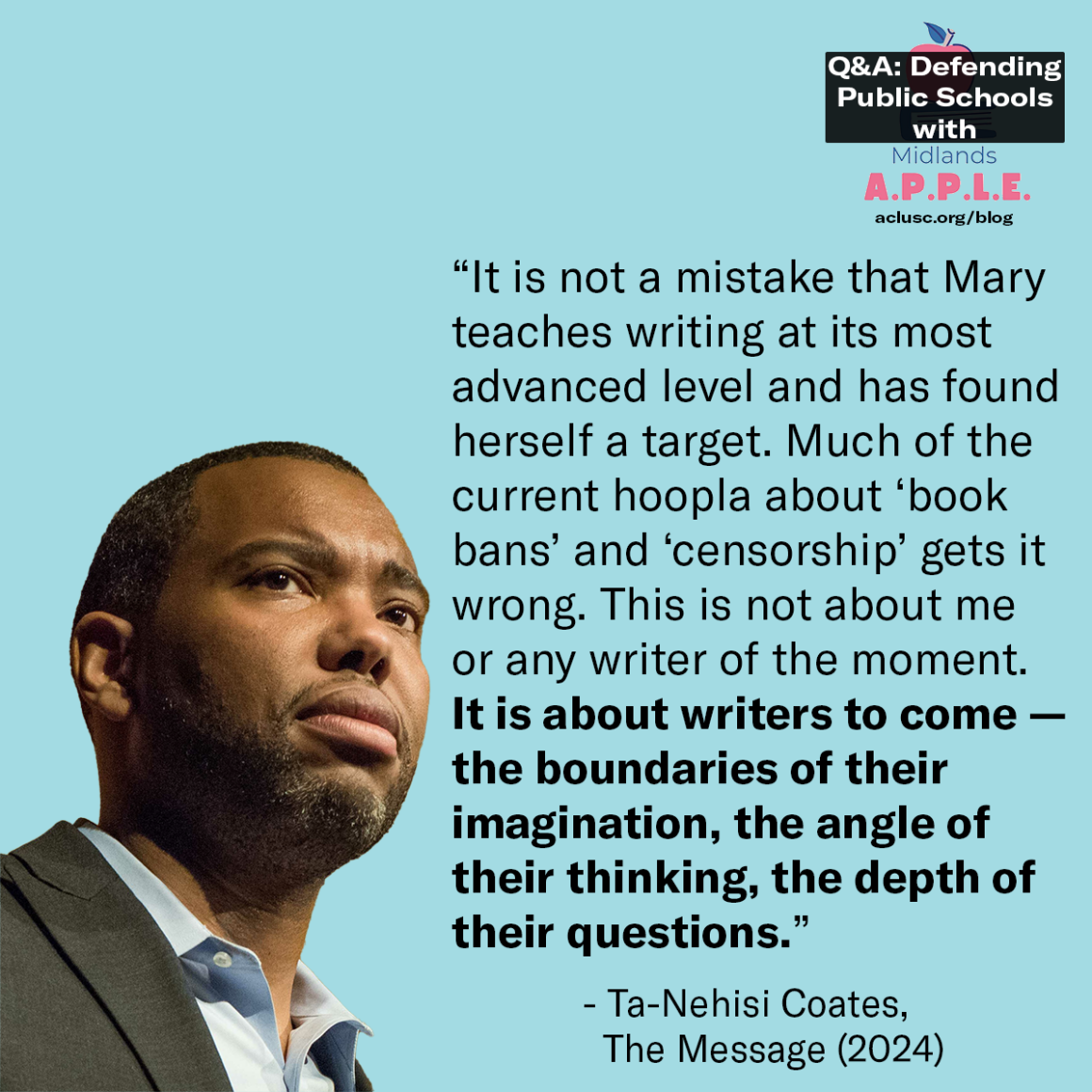
Coates gave you a shout-out onstage on his latest book tour in South Carolina, and as you know he mentioned you several times in his latest book The Message. I was wondering if you could respond to the point he made in this passage (p. 109): “It is not a mistake that Mary teaches writing at its most advanced level and has found herself a target. Much of the current hoopla about ‘book bans’ and ‘censorship’ gets it wrong. This is not about me or any writer of the moment. It is about writers to come — the boundaries of their imagination, the angle of their thinking, the depth of their questions.”
I agree with him. It could have been any book. It happened to be Between the World and Me, but we’ve seen a lot of other books being banned as well. Books tap into our curiosity, they make us think, they help us to make connections to other people, to other places, to other perspectives, and that’s important for fostering growth in a global society. The act of writing deepens your curiosity, and the act of reading deepens your curiosity and helps develop your critical thinking.
If children are thinking for themselves, which is what we should promote — we shouldn’t promote them to think the way that I think or the way that you think, we should be helping them to come to terms with the world in their own way — that happens through reading. Their voices are empowered, and they realize that they have a lot more in common than they don’t, and we tear down walls that are superficially constructed to keep people segregated from one another or marginalize populations. That is what a lot of this censorship attacks: Our ability to grow together instead of grow apart.
Teachers and librarians are sometimes afraid to speak out like you do. They’re worried about their jobs, and often they’re under tremendous social pressure. What advice would you give to people like you who find themselves under that kind of pressure?
The first thing that they should know is the policies that are being used to set up roadblocks for their ability to teach with integrity — those policies are not always applied in the manner in which they’re supposed to, and a lot of times those policies are vague and intentionally so. That’s the first thing I would recommend.
The second thing I would recommend is know your rights, your legal rights. Teachers are in this situation where we’re far down on the totem pole of respect and appreciation, and that is something we internalize ourselves: that I don’t deserve respect, I don’t deserve appreciation, and I probably deserve to be treated in whichever way that I am. Whether that’s being accused of having done something wrong or being punished for teaching a certain book, the fact is that you’re a professional and you deserve respect, and there are laws that protect you.
Joining a teachers’ association like The SCEA or the other ones that are available wherever you live is helpful, especially with regards to legal advice. Becoming part of a community like APPLE, for instance, we will be providing a learning lab to help teachers understand their rights — that can be very helpful. Reaching out to teachers like me who have gone through these situations, I’m happy to help.
The thing that people forget is that our collective voices are important. They are powerful when we work together. Instead of isolating yourself whenever challenging times happen, reaching out to the community of educators or reaching out to community organizations that can support you is vitally important.
Lastly, be brave, and be willing to stand on your merits. I always say that if I can’t do my job with integrity, then I can’t do my job. Giving in to ridiculous demands means that you can’t really do your job with integrity. So if you are going to teach, then teach, and do it with the character that defines you.
